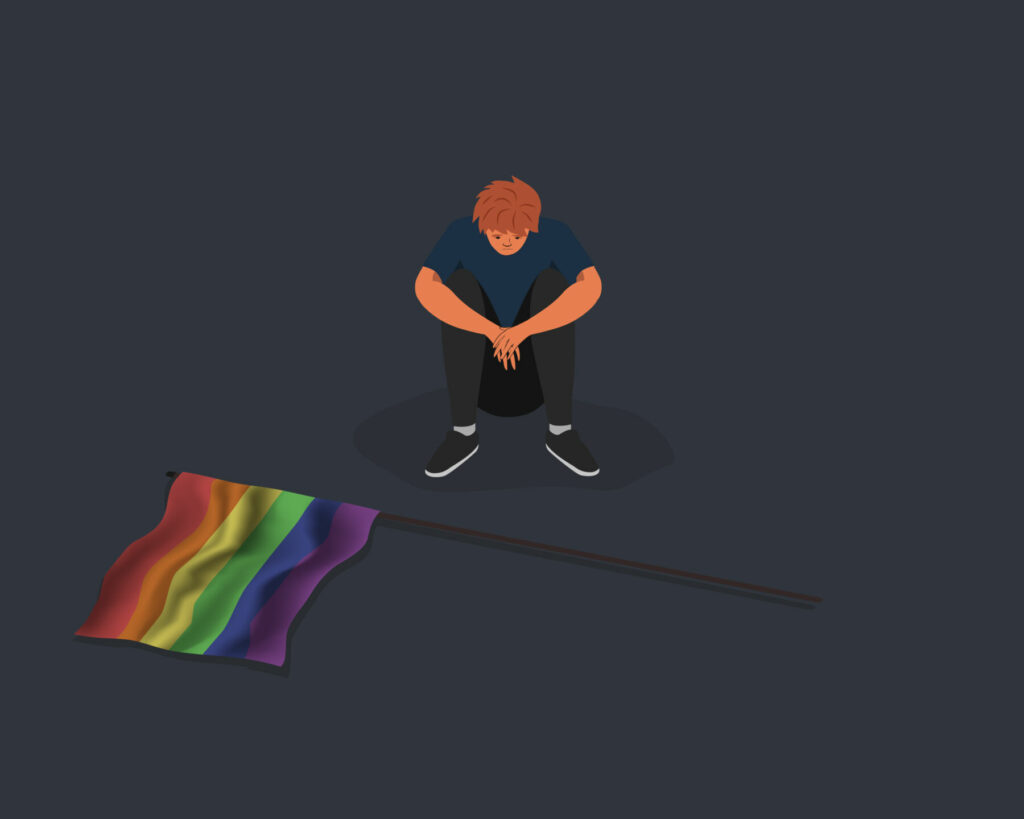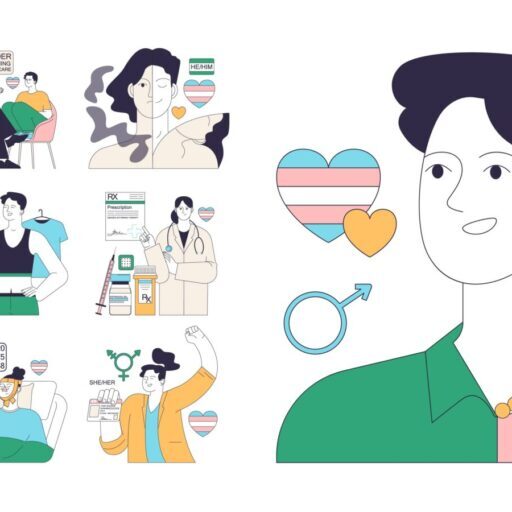Coping with Post-Pride Blues: Strategies for LGBTQIA+ People

Pride Month offers a profound sense of unity and visibility for many queer people, not to mention the fun of parades, festivals, and parties. For many, it’s a period of intense highs, where the joy of recognition, the resilience of shared experiences, and the fervor of advocacy come to the forefront.
Being surrounded by people who care for and celebrate you can be incredibly uplifting. However, these celebratory experiences can often be followed by a post-pride month period of contrasting sadness and isolation once the festivities end, a phenomenon sometimes referred to as post-pride depression.
It’s important to note that not all queer people participate in Pride Month, and some may not enjoy or even feel alienated by it. However, for those who do engage, the transition from the communal celebrations of June to the quieter days of July can be challenging.
The abrupt shift can leave individuals feeling lonely and aware of the ongoing struggles faced by the LGBTQIA+ community. Recognizing that post-pride month depression is real and common is the first step towards managing it effectively. You are not alone in this experience, and there are strategies available to help!
Coping with Post-Pride Depression
When dealing with post-pride depression, consider these tips!
- Firm up the foundation! It’s essential to start by addressing your basic needs. During periods of emotional distress, people often neglect their physical health, which can exacerbate feelings of sadness and lethargy.
Ensuring you get adequate sleep, eat well, and maintain a regular exercise routine is crucial. Sleep is a fundamental component of mental health, as it allows your body and mind to rest and rejuvenate. Similarly, a balanced diet can stabilize your mood and energy levels, while regular physical activity releases endorphins, the body’s natural mood lifters. - Acknowledge your feelings! Experiencing your feelings without becoming stuck in them is another critical aspect of managing post-pride depression. Allow yourself to acknowledge and feel your emotions, but take steps to prevent them from overwhelming you. Walking can be a meditative practice, offering a chance to clear your mind and connect with your surroundings.
Formal meditation is another powerful tool for managing emotions, and there are many apps, such as Headspace or Calm, that can guide you through mindfulness practices. If you find yourself caught in a cycle of rumination, where you are fixating on a thought or feeling without any resolution, it might be time to talk to someone. Reaching out to a friend or an LGBTQIA+ affirming therapist can provide a new perspective and support. - Let them out creatively! Creative expression can also be a therapeutic outlet for processing emotions. Making art, whether through painting, writing, or music, allows you to channel your feelings into something tangible. Additionally, spending time in nature can be incredibly grounding (Have you heard of the Japanese concept of “forest bathing?”). Immersing yourself in the natural world, observing the sights and sounds around you, can help you feel more present and connected.
- Engage in community! Cultivating a sense of community is vital for mental health. Being part of a community where you are seen and celebrated can provide a sense of belonging and support. Consider joining an LGBT sports league, such as Chicago’s Stonewall or CSMA leagues, where you can engage in physical activity and build connections. Similarly, participating in a queer Meet-Up group or your company’s LGBT employee resource group (ERG) can offer opportunities for social interaction and support.
- Embrace the whole of you! It’s also important to embrace other aspects of your identity beyond your queer or LGBT identity. Engaging in activities that bring you joy and fulfillment can help you feel more balanced. This might include pursuing hobbies, professional interests, or other personal passions. For instance, you might take up a new hobby, join a book club, or work on a passion project that excites you.
- Delve into queer history! Understanding the struggles and triumphs of past generations of queer people can provide a sense of belonging and boost your self-esteem. Learning about the history of the LGBTQIA+ community can be empowering and grounding, reminding you of the progress made and the resilience of those who came before you. Chicago’s Gerber Hart Library and Archives is the midwest’s clearinghouse for LGBT+ history. Check it out!
- Find an LGBT Affirming Therapist! Seeking professional help is another proactive step in managing post-pride depression. Talking to a therapist who is affirming of queer and LGBTIA+ identities can provide you with tools and strategies tailored to your specific needs. Professional guidance can help you navigate your feelings and develop coping mechanisms.
- Find representations! Representation matters, and seeing yourself reflected in the media can be incredibly affirming. Seek out movies, TV shows, YouTube channels, and TikToks that positively portray queer people. Doing so can validate your experiences and provide a sense of connection to the broader community.
- Be queer you! Leaning into your queerness and finding joy within it can also counter feelings of post-pride month depression. Consider going on a date, spending time with your chosen family, or celebrating love and connection within your community. Physical intimacy, whether through sex or other forms of connection, can also be a source of joy and fulfillment.
- Build value-behavior congruence! Aligning your daily actions with your true self and values is crucial for well-being. Regularly assessing your values and ensuring your actions reflect them can help you feel more congruent and authentic. Listening to feedback from affirming friends and family about how you move through the world can also provide valuable insights.
- Embrace your spirituality! Cultivating spiritual wellness, for those that find comfort in spirituality, can provide a sense of peace and purpose. Engaging in practices that nurture your spirit, such as meditation, prayer, or spending time in nature, can enhance your overall well-being.
- Keep exercising your pride! Pride is not confined to a single month; it is a continuous celebration of the progress made and a call to action for the work that remains. Engaging in advocacy throughout the year can help maintain the spirit of Pride and keep you connected to the community.
Joining organizations like Chicago’s Gays for Good, volunteering for political campaigns, donating to LGBTQIA+ causes, or volunteering your time to community efforts are all ways to stay engaged and contribute to the ongoing fight for equality.
Post-pride depression is a real and shared experience for many in the queer and LGBTQIA+ community. By addressing your basic needs, experiencing your feelings without getting stuck in them, cultivating community, embracing other aspects of your identity, reading queer history, seeking therapy, finding representation in media, leaning into your queerness, aligning daily actions with your true self, and nurturing spiritual wellness, you can manage and mitigate the effects of post-pride depression. Remember, pride is not confined to a single month; it’s a continuous journey of celebration and advocacy.
This blog is made for informational and educational purposes only. It is not medical advice. The information in this blog is not intended to (1) replace a one-on-one relationship with a qualified licensed health care provider, (2) create or establish a provider-patient relationship, or (3) create a duty for us to follow up with you.



